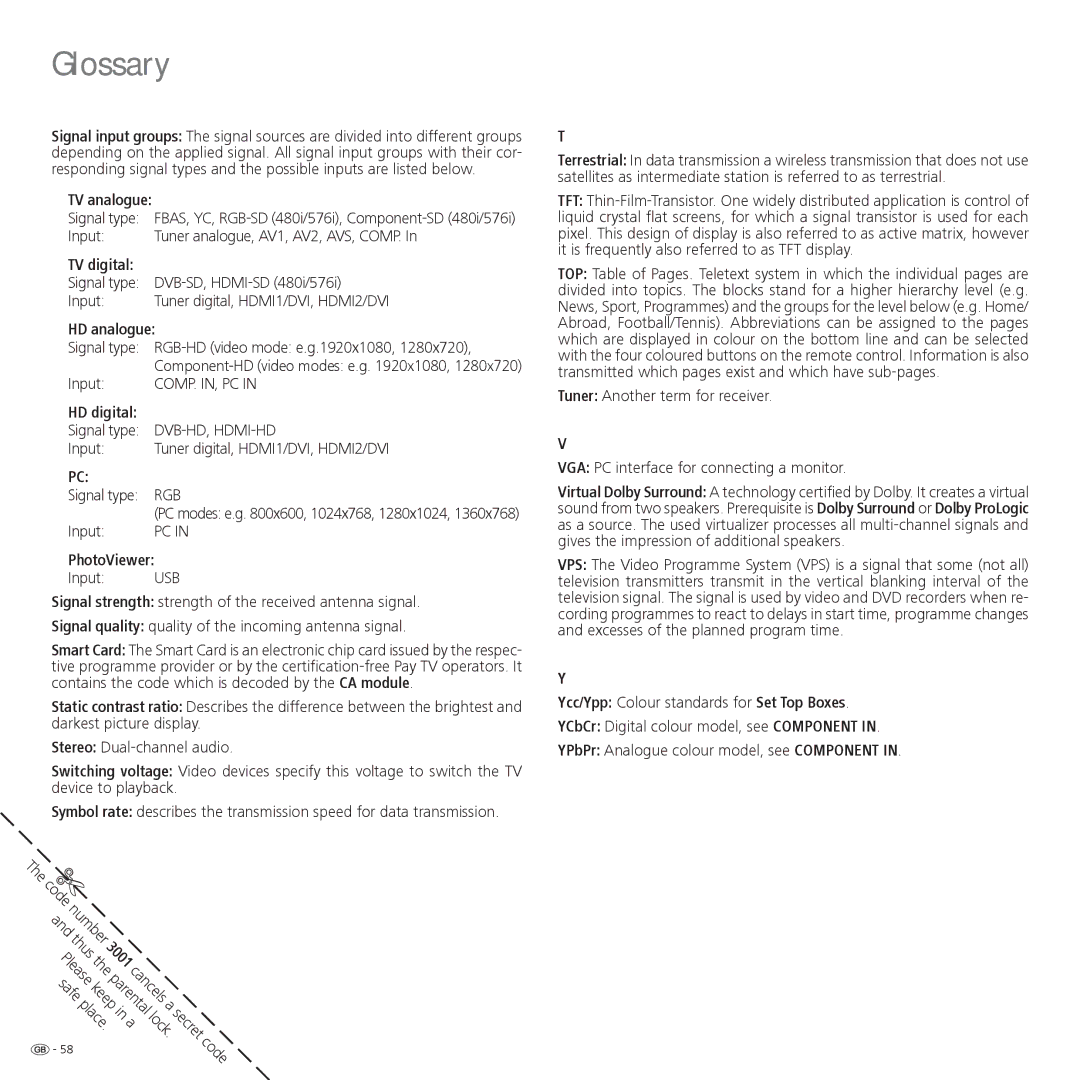
Glossary
Signal input groups: The signal sources are divided into different groups depending on the applied signal. All signal input groups with their cor- responding signal types and the possible inputs are listed below.
TV analogue:
Signal type: FBAS, YC,
Input: Tuner analogue, AV1, AV2, AVS, COMP. In
TV digital:
Signal type:
Input: | Tuner digital, HDMI1/DVI, HDMI2/DVI |
HD analogue:
Signal type: | |
| |
Input: | COMP. IN, PC IN |
HD digital: |
|
Signal type: | |
Input: | Tuner digital, HDMI1/DVI, HDMI2/DVI |
PC: |
|
Signal type: | RGB |
| (PC modes: e.g. 800x600, 1024x768, 1280x1024, 1360x768) |
Input: | PC IN |
PhotoViewer:
Input: USB
Signal strength: strength of the received antenna signal.
Signal quality: quality of the incoming antenna signal.
Smart Card: The Smart Card is an electronic chip card issued by the respec- tive programme provider or by the
Static contrast ratio: Describes the difference between the brightest and darkest picture display.
Stereo:
Switching voltage: Video devices specify this voltage to switch the TV device to playback.
Symbol rate: describes the transmission speed for data transmission.
The |
|
|
|
|
|
|
|
|
|
|
|
code |
|
|
|
|
|
number |
|
|
|
| |
and |
|
|
|
|
|
thus |
|
|
|
| |
| 3001 |
|
| ||
Please |
|
|
|
| |
| the | cancels | |||
safe |
|
| |||
| parental | a | |||
| keep |
|
|
| |
place | in |
| secret | ||
| . |
|
| ||
| a | lock | |||
|
|
|
| . | |
- 58 |
|
|
|
| code |
|
|
|
|
| |
T
Terrestrial: In data transmission a wireless transmission that does not use satellites as intermediate station is referred to as terrestrial.
TFT:
TOP: Table of Pages. Teletext system in which the individual pages are divided into topics. The blocks stand for a higher hierarchy level (e.g. News, Sport, Programmes) and the groups for the level below (e.g. Home/ Abroad, Football/Tennis). Abbreviations can be assigned to the pages which are displayed in colour on the bottom line and can be selected with the four coloured buttons on the remote control. Information is also transmitted which pages exist and which have
Tuner: Another term for receiver.
V
VGA: PC interface for connecting a monitor.
Virtual Dolby Surround: A technology certified by Dolby. It creates a virtual sound from two speakers. Prerequisite is Dolby Surround or Dolby ProLogic as a source. The used virtualizer processes all
VPS: The Video Programme System (VPS) is a signal that some (not all) television transmitters transmit in the vertical blanking interval of the television signal. The signal is used by video and DVD recorders when re- cording programmes to react to delays in start time, programme changes and excesses of the planned program time.
Y
Ycc/Ypp: Colour standards for Set Top Boxes.
YCbCr: Digital colour model, see COMPONENT IN.
YPbPr: Analogue colour model, see COMPONENT IN.
